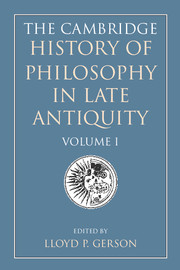Book contents
- Frontmatter
- General introduction
- I Philosophy in the later Roman Empire
- Introduction to Part I
- 1 The late Roman Empire from the Antonines to Constantine
- 2 The transmission of ancient wisdom: texts, doxographies, libraries
- 3 Cicero and the New Academy
- 4 Platonism before Plotinus
- 5 The Second Sophistic
- 6 Numenius of Apamea
- 7 Stoicism
- 8 Peripatetics
- 9 The Chaldaean Oracles
- 10 Gnosticism
- 11 Ptolemy
- 12 Galen
- II The first encounter of Judaism and Christianity with ancient Greek philosophy
- III Plotinus and the new Platonism
- IV Philosophy in the age of Constantine
- V The second encounter of Christianity with ancient Greek philosophy
- Map 1 The Byzantine Empire, c. 500
2 - The transmission of ancient wisdom: texts, doxographies, libraries
from I - Philosophy in the later Roman Empire
Published online by Cambridge University Press: 28 May 2011
- Frontmatter
- General introduction
- I Philosophy in the later Roman Empire
- Introduction to Part I
- 1 The late Roman Empire from the Antonines to Constantine
- 2 The transmission of ancient wisdom: texts, doxographies, libraries
- 3 Cicero and the New Academy
- 4 Platonism before Plotinus
- 5 The Second Sophistic
- 6 Numenius of Apamea
- 7 Stoicism
- 8 Peripatetics
- 9 The Chaldaean Oracles
- 10 Gnosticism
- 11 Ptolemy
- 12 Galen
- II The first encounter of Judaism and Christianity with ancient Greek philosophy
- III Plotinus and the new Platonism
- IV Philosophy in the age of Constantine
- V The second encounter of Christianity with ancient Greek philosophy
- Map 1 The Byzantine Empire, c. 500
Summary
TEXTS
Among the authors writing in Greek between the archaic period and the end of Hellenistic times, there is only one philosopher whose oeuvre reached us in its entirety: Plato. Although our corpus of Aristotle’s work is far from complete, we have about thirty treatises generally accepted as authentic, and these works contain a significant part of Aristotle’s philosophical output. With the founding fathers of the Hellenistic schools and their immediate followers, we are much worse off. Diogenes Laertius lists forty-one treatises as Epicurus’ ‘best books’, out of which On Nature by itself was apparently almost double the size of the entire Platonic corpus. Of this monumental oeuvre only Epicurus’ brief summaries of his central doctrines have reached us as quoted by Diogenes Laertius. From the early Stoics the only work that survives is Cleanthes’ Hymn to Zeus, transmitted by Stobaeus. Short fragments and quotations remain of the more than 700 treatises of Chrysippus. No complete work of any of the Presocratics is preserved. The situation is considerably better with Latin texts written around the end of the Hellenistic period with the aim of transmitting Greek wisdom to the educated Roman audience: we have a number of Cicero’s philosophical works as well as Lucretius’ poem that closely follows Epicurus’ On Nature. For the vast majority of thinkers up to the end of the first century bce we are entirely dependent on the indirect evidence of quotations, paraphrases and summaries.
- Type
- Chapter
- Information
- The Cambridge History of Philosophy in Late Antiquity , pp. 25 - 38Publisher: Cambridge University PressPrint publication year: 2000
- 1
- Cited by

